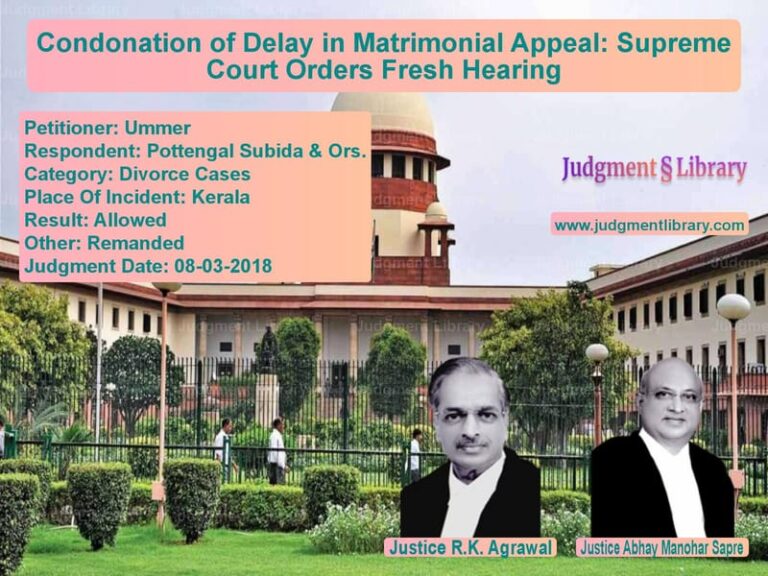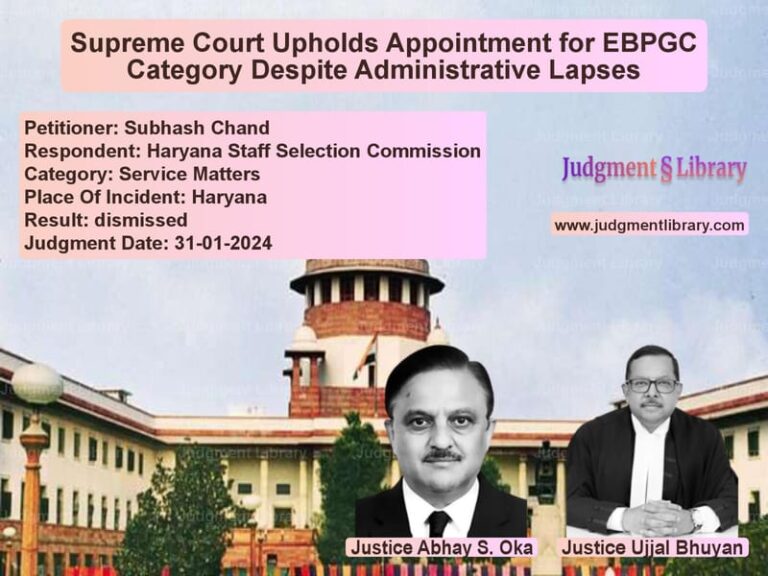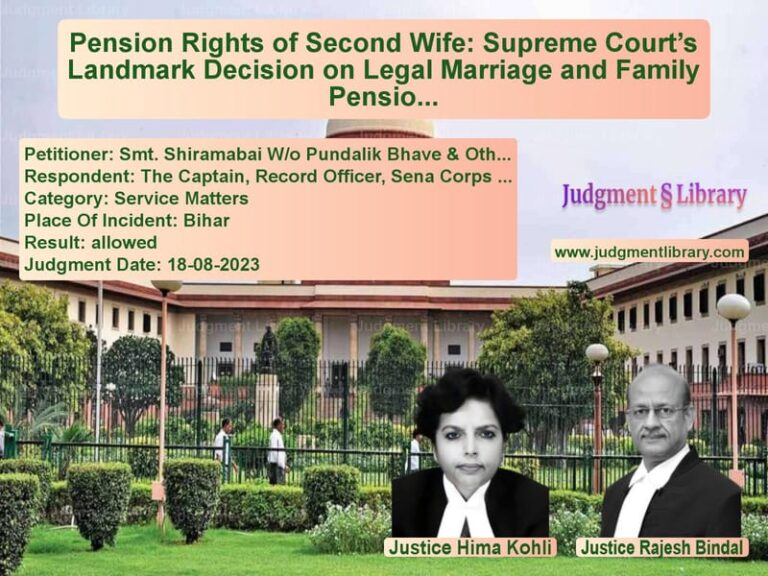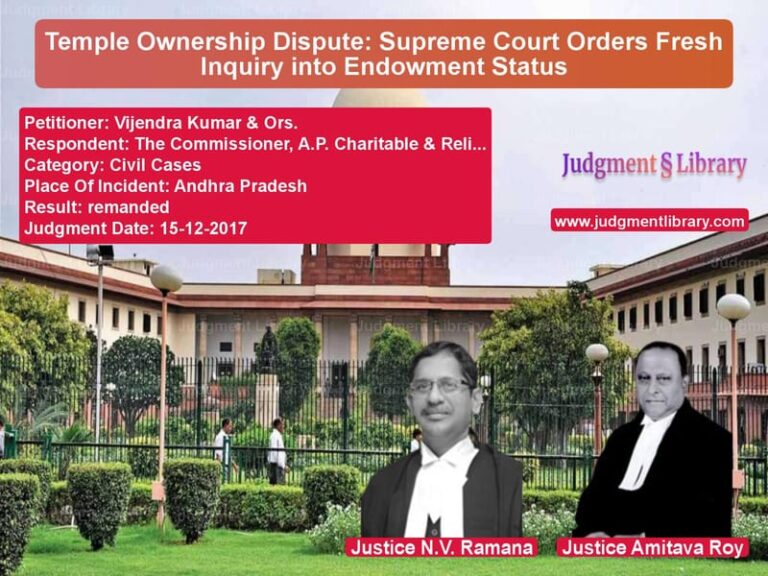Supreme Court Issues Landmark Guidelines for Speedy Execution of Civil Decrees
The Supreme Court of India, in the case of Rahul S. Shah v. Jinendra Kumar Gandhi & Others, issued a landmark judgment addressing the long-standing issue of delays in the execution of civil decrees. The Court laid down comprehensive guidelines to ensure the effective and expeditious enforcement of judgments, emphasizing the need for judicial discipline, reduced procedural abuse, and a streamlined execution process.
Background of the Case
The case arose from a prolonged property dispute in Karnataka involving multiple sales, conflicting ownership claims, and continuous litigation over several decades. The appellant, Rahul S. Shah, and the respondents, including Jinendra Kumar Gandhi, had been engaged in litigation concerning a property measuring 1 Acre in Bengaluru. The property had changed hands multiple times, with some transactions occurring even after judicial decrees were issued.
Read also: https://judgmentlibrary.com/supreme-court-rules-on-tenant-rights-in-wakf-property-landmark-judgment/
The Karnataka High Court dismissed several writ petitions filed by unsuccessful litigants who were attempting to delay execution proceedings. The case ultimately reached the Supreme Court, which decided to address systemic issues affecting the execution of decrees in civil matters.
Key Issues Raised
- Why do execution proceedings in civil cases face significant delays?
- What measures can be implemented to prevent obstruction and abuse of procedural provisions?
- What role do courts play in ensuring that successful litigants receive timely relief?
- Should there be stricter penalties for frivolous objections and delaying tactics?
Arguments by the Appellant (Rahul S. Shah)
- “The respondents have repeatedly filed objections and initiated fresh litigation to prevent the execution of valid decrees.”
- “Despite a clear judicial order in my favor, I have been unable to take possession of the property due to continuous obstruction.”
- “The execution process is being used as a tool for harassment rather than an instrument of justice.”
Arguments by the Respondents
- “There are pending disputes regarding ownership and possession that must be resolved before execution.”
- “The property’s boundaries are unclear, necessitating further verification before any execution can take place.”
- “The High Court’s decision should be upheld to prevent wrongful dispossession of innocent parties.”
Supreme Court’s Observations and Ruling
1. Need for Speedy Execution
- “Execution proceedings should not become a separate trial; they must be concluded swiftly to ensure that decree-holders receive timely relief.”
- “As of December 31, 2018, there were over 11.8 lakh execution petitions pending in subordinate courts, indicating a systemic issue that needs urgent redress.”
2. Abuse of Procedural Provisions
- “Many judgment debtors use frivolous objections, third-party claims, and fabricated disputes to stall execution proceedings.”
- “Courts must ensure that objections raised at the execution stage are only those that could not have been raised during the original suit.”
3. Directions for Judicial Reforms
- “Courts must examine parties under Order X of CPC to identify third-party interests at the outset of litigation.”
- “If a decree involves immovable property, a Court Commissioner must be appointed to record the status of the property and avoid boundary disputes at the execution stage.”
- “Courts must use their powers under Order XI Rule 14 to compel parties to disclose all material documents at the earliest stage.”
4. Strengthening the Execution Process
- “Executing courts must dispose of execution proceedings within six months from the date of filing, with an extension granted only for valid reasons recorded in writing.”
- “Police assistance must be provided if required for enforcing possession decrees, and obstructionists should face penalties for non-compliance.”
- “Compensatory costs must be imposed on those who raise baseless objections or attempt to delay execution.”
Supreme Court’s Judgment
The Supreme Court issued the following key directions:
- The High Court’s ruling was upheld, dismissing the respondents’ objections and directing the execution of the decree.
- All High Courts must update their rules governing execution proceedings within one year to align with the Supreme Court’s guidelines.
- The trial courts must ensure that execution cases do not become a separate round of litigation.
- The Karnataka government was directed to provide police assistance to ensure smooth execution of decrees.
- Judges failing to enforce execution orders within six months without valid reasons will be subject to judicial scrutiny.
Key Takeaways from the Judgment
- Judicial delays must be eliminated: The Court recognized that decree-holders face years of litigation even after winning their case.
- Courts must take proactive steps: The judiciary must identify procedural abuses and address them before execution proceedings begin.
- Frivolous objections will be penalized: Delaying tactics will not be entertained, and parties attempting to obstruct justice will face severe consequences.
- Police intervention when necessary: The judiciary must not hesitate to seek law enforcement assistance to enforce court orders.
Conclusion
The Supreme Court’s decision in Rahul S. Shah v. Jinendra Kumar Gandhi & Others is a landmark ruling that will significantly impact the enforcement of civil decrees across India. By issuing time-bound directives and strengthening procedural safeguards, the Court has reaffirmed its commitment to ensuring that justice is not just granted but also effectively implemented.
Petitioner Name: Rahul S. Shah.Respondent Name: Jinendra Kumar Gandhi & Others.Judgment By: Justice S.A. Bobde, Justice L. Nageswara Rao, Justice S. Ravindra Bhat.Place Of Incident: Bengaluru, Karnataka.Judgment Date: 22-04-2021.
Don’t miss out on the full details! Download the complete judgment in PDF format below and gain valuable insights instantly!
Download Judgment: rahul-s.-shah-vs-jinendra-kumar-gandh-supreme-court-of-india-judgment-dated-22-04-2021.pdf
Directly Download Judgment: Directly download this Judgment
See all petitions in Specific Performance
See all petitions in Landlord-Tenant Disputes
See all petitions in Judgment by S. A. Bobde
See all petitions in Judgment by L. Nageswara Rao
See all petitions in Judgment by S Ravindra Bhat
See all petitions in allowed
See all petitions in supreme court of India judgments April 2021
See all petitions in 2021 judgments
See all posts in Civil Cases Category
See all allowed petitions in Civil Cases Category
See all Dismissed petitions in Civil Cases Category
See all partially allowed petitions in Civil Cases Category







